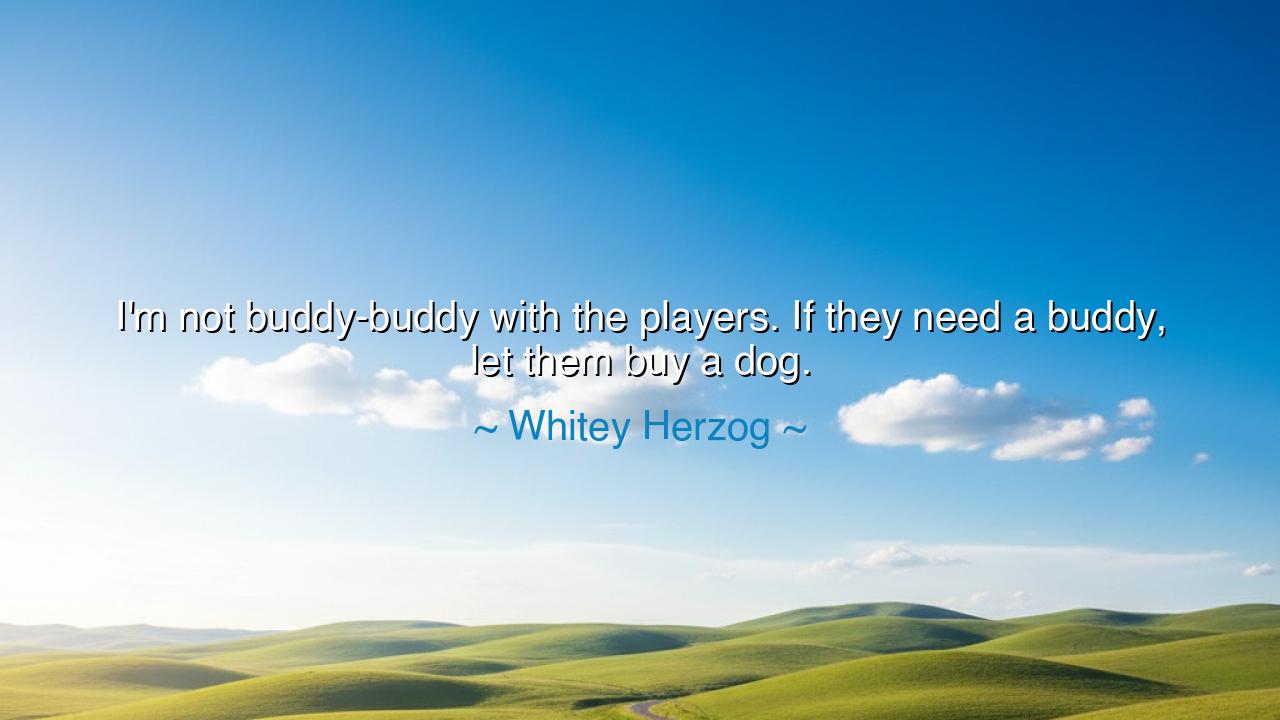
I'm not buddy-buddy with the players. If they need a buddy, let






When Whitey Herzog, the cunning general of the diamond, spoke the words, “I’m not buddy-buddy with the players. If they need a buddy, let them buy a dog,” he was not weaving a jest, but proclaiming a creed of leadership. In his voice resounded the ancient truth: a leader’s duty is not to flatter or to soothe, but to guide, to discipline, and to demand greatness. For friendship may comfort, but it does not sharpen; companionship may please, but it does not elevate. The manager who seeks to be loved above all else soon loses the respect that commands victory.
Herzog was known as the “White Rat,” a strategist whose sharp mind and uncompromising will lifted the St. Louis Cardinals to glory in the 1980s. He built his teams not on sentiment, but on accountability. To him, the field was not a playground for friendship—it was an arena where men tested their limits and sought excellence. Thus, his quote is not coldness, but clarity. The manager is not there to be your drinking partner or your confidant. He is there to lead you into battle, to forge victory out of sweat and discipline.
Consider the story of Herzog’s 1982 Cardinals, a team that stunned the baseball world with their speed, defense, and relentless will. They were not the most powerful hitters, nor the most celebrated stars. Yet Herzog demanded of them sacrifice, precision, and unyielding effort. He cut through egos and sentiment, holding every man accountable to the standard of the team. The result? A World Series crown. Not because Herzog was “buddy-buddy,” but because he was steadfast in his purpose, the commander who knew that victory required respect more than affection.
The ancients knew this too. The generals of Sparta did not feast with their soldiers as equals, nor did the Roman centurions lull their men with gentle words. They demanded discipline, order, and loyalty—not out of cruelty, but because the stakes were life and death. A soldier might resent his commander in the quiet moments, but in the clash of spears he would bless the iron discipline that had honed him for survival. So too in baseball, Herzog’s creed echoed this timeless wisdom: a leader must sometimes stand apart, lest his closeness weaken the authority that preserves the team.
The lesson is clear: in life, as in sport, do not mistake leadership for friendship. There are roles in which affection must yield to duty, and kindness to firmness. The teacher who spares every correction does his pupil no service. The parent who seeks only to be liked by the child leaves the child unprepared for the world’s hardness. The leader who puts popularity before principle soon leads his people astray. True guidance is forged in courage, honesty, and discipline, even when it wounds the heart in the moment.
What then must we do? If you are in a place of leadership, do not shrink from being firm. Speak the truth, even if it stings. Correct mistakes, even if it earns you no thanks. Remember Herzog’s wisdom: if they need a buddy, let them buy a dog—your charge is not to be their companion, but their guide. And if you are the one being led, do not resent the hand that disciplines. Look instead for the wisdom within it, and honor the leader who dares to make you stronger rather than softer.
And so, Whitey Herzog’s words endure as a teaching for the ages. “I’m not buddy-buddy with the players. If they need a buddy, let them buy a dog.” It is a reminder that friendship has its place, but leadership has its duty. Seek not always to be liked, but to be respected. Seek not always comfort, but growth. For in the end, those who lead with discipline, and those who follow with humility, shall find themselves standing together in triumph, as victors in life’s unending game.






AAdministratorAdministrator
Welcome, honored guests. Please leave a comment, we will respond soon